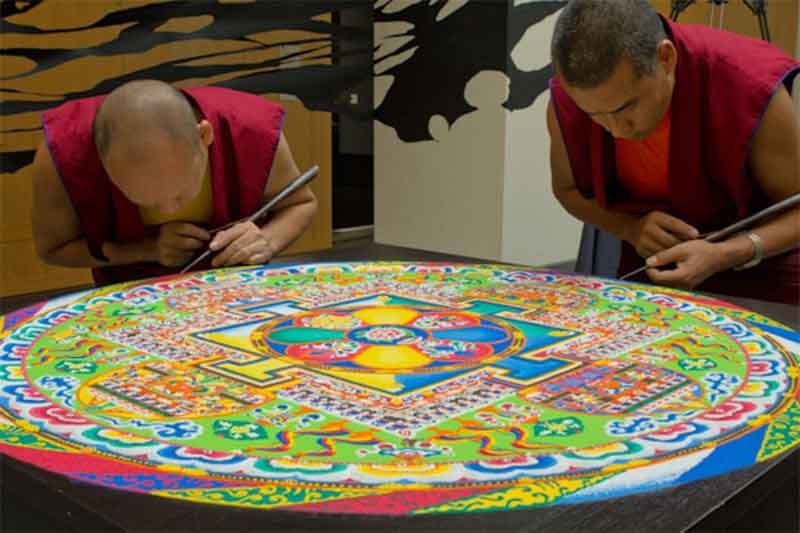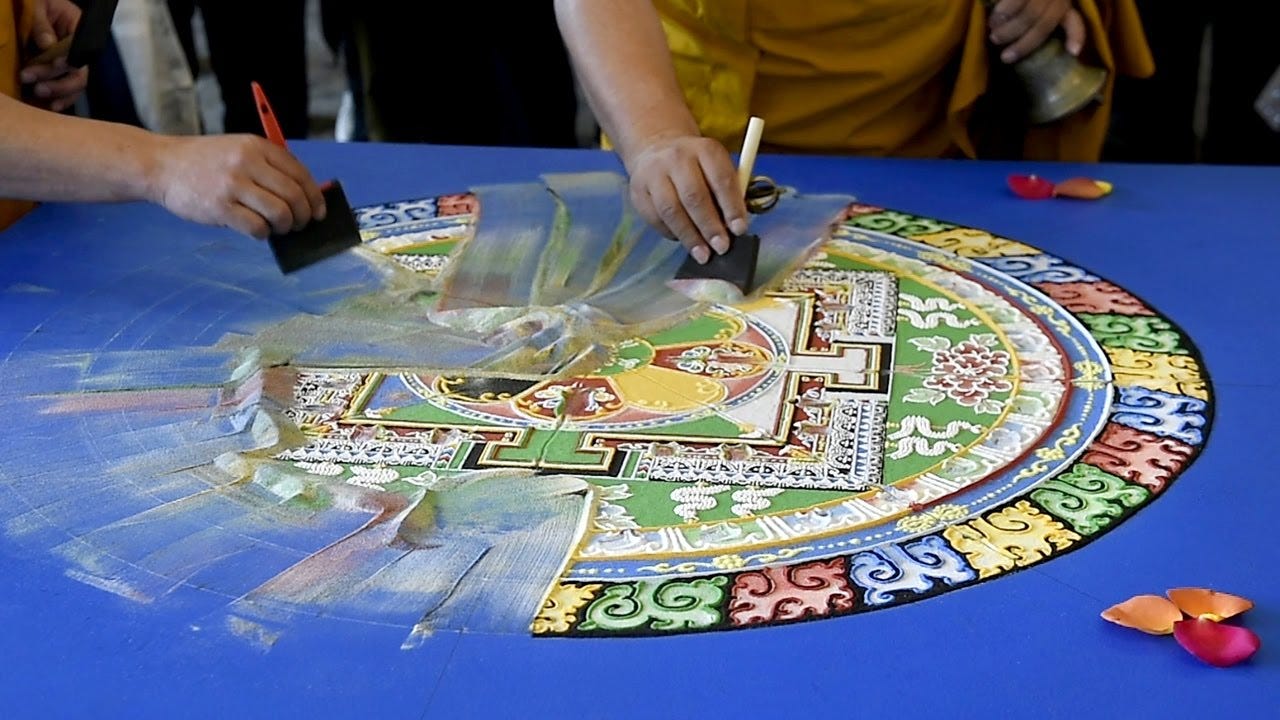Why do monks spend so much of their lives doing boring things?
Sweeping, cleaning, arranging, meditating. A monk’s life consists of mundane routines and rituals repeated daily. Yet, even though most of us would never swap lives with a monk, there’s an allure to their way of being. We visit their shrines when we travel. We explore the serene beauty and may even wish to experience some small amount of their perspective.
There’s a refreshing amount of humility to it all. And there’s a drama to it. The complete dedication to mundane ritual as a path to a spiritual awakening is confronting in the modern context of achievement, growth, and progress. Their way of life is entirely contrary to how most people expect and demand life for themselves.
For example, Tibetan monks have this incredible practice where they spend upwards of ten days creating a sand mandala. They’re gorgeous, intricate pieces of art that require intense focus.
Then, once the mandala is finished, the monks wipe it clean. Just like that, it’s gone.
Like I said, dramatic.
But it’s a beautiful reminder of the impermanence of the human experience and the meaning that can be created through mundane tasks. Appreciating the small, ordinary moments that make up life can have not only philosophical benefits but also tangible ones, according to research.
Studies in psychology and neuroscience have confirmed the intrinsic link between gratitude and happiness, with the former sparking increased feelings of optimism, joy, and contentment (Wood, Froh, & Geraghty, 2010). Those who regularly practice gratitude report fewer physical symptoms of distress and have improved health routines (Emmons & McCullough, 2003). Even sleep quality is positively affected, with a gratitude practice leading to better sleep duration and quality (Wood, Joseph, Lloyd, & Atkins, 2009).
Beyond personal well-being, gratitude fosters stronger social bonds and facilitates prosocial behavior, making people more willing to assist others (Bartlett & DeSteno, 2006). Neurologically, gratitude activates brain regions associated with dopamine release, a feel-good hormone, mirroring a natural reward response (Fox, Kaplan, Damasio, & Damasio, 2015). Over time, a consistent gratitude practice can lead to long-lasting changes in the brain's neuroplasticity, fostering a more positive outlook and resilience (Emmons & Stern, 2013).
In essence, the lessons from the monks are not just limited to spiritual insights but also hint at a scientifically backed approach to enhanced well-being.
Of course, most of us will never become a monk. We're not going to shave our heads, release all of our worldly possessions, renounce our families, and move into the woods to sleep on a tatami mat. But what if we could adopt just a fraction of a monk's perspective, a fraction of their dedication to the mundane? This is where the concept of the 'Fractional Monk' comes in. We can cultivate an increased sense of presence, gratitude, and satisfaction by seamlessly integrating a small amount of this monk-like approach into our everyday routines.
Our lives are still filled with routine, mundane tasks. It may not be an evident dedication, such as the monks’ life, but everyone encounters many mundane tasks daily.
At its core, monastic life values a set of practices for creating personal meaning in a meaningless (when you zoom really, really far out) world. And, inside every human (monk or not), a fire burns with the desire to create meaning out of our lives. Some people do it with important careers. Others do it through their relationships with their children.
But, most of our lives will not be spent experiencing peak moments. The majority of our lives will consist of routine, mundane moments. Moments that can easily get categorized as boring, which leads to discounting these monotonous tasks. A desire to rush through them on to the next important thing. Except, a small moment of gratitude gets amplified when it’s repeated over a lifetime.
When you approach your tasks as acts of dedication instead of mere chores, they take on a new, deeper meaning. You're not just doing laundry or washing dishes—you're creating order for your mind to be more creative, instilling peace for the well-being of your family. It’s a form of mindfulness, a meditative technique hiding among the monotonous chores of daily life.
A famous figure and personal hero of mine, Anthony Bourdain, echoed this sentiment. In the below clip, Bourdain speaks with locals in Singapore about how much they rely on their maids.
Except the part that I love, the part that’s relevant is at the 00:56 mark when Bourdain shares how much he enjoys doing laundry. How therapeutic it is for him. He says, “It’s a process that makes you feel very satisfied with yourself.”
Bourdain lived a chaotic, ungrounded, and ultimately tragic life. Laundry felt therapeutic to him because it was simple and in his control. Bourdain had a monk-like perspective on laundry. He recognized beauty and purpose in a simple, mundane task.
There’s no need to live an ascetic life or the life of an addict to reap the benefits of treating a simple act like laundry as a monk. Our lives are mostly filled with mundane moments. Obligations. Chores. Errands. Ugh, that’s so boring. It’s so tedious. I’d rather die than do that! The only difference between a monk and me is their perspective towards their daily chores.
We both have mundane tasks that form the foundation of our livelihood. The monk focuses intently on the duties of sweeping their temple. They view each broom stroke as devotion to a higher power. I try to finish it as fast as possible to move on to “something more important.”
And, of course, there are things more important than sweeping or cleaning. Except, when faced with the inevitable mundane task, treat it how a monk treats theirs, with devotion and gratitude for something greater. Maybe that something greater is your family, maybe it’s your spouse, maybe it’s yourself. You get to choose who to devote that task to.
American pop culture discounts these moments' importance as a path to living a meaningful life. There’s no status in that. There’s no gain to that. While that’s true in many ways, it discounts that our lives will always have mundane, routine moments. They’re inescapable. So how we choose to view them, our perspective towards them, either as another chore to cross off the list or a gift in service of something greater, gives us the benefits of being a monk without the bad haircuts or scratchy robes.
Living with this perspective creates more moments of gratitude that compound daily into a happier, healthier life.
In my own life, I recently moved into a house that has extensive gardens. The owners before us took diligent care and built these gorgeous gardens filled with native plants. When Taylor and I first bought the house, I was confronted with the amount of daily work required to maintain the gardens.
Before we moved to the house, I did a mental check-in with myself. I was moving from a house with few chores to a house with many. I wanted to ensure that I viewed the increased responsibility like a monk, as a devotion and a gift to my family rather than another chore to do as fast as possible.
Nine months in, and I’ve done an OK job. But, writing this newsletter inspires me to treat these to-dos as an act of service to something greater—an opportunity to live with gratitude and imbue meaning into the mundane.
The human life is always filled with work, tasks, and to-dos. There's never an end. That's where the wisdom of the Fractional Monk comes in, reminding us to see these tasks not as chores but as opportunities for devotion and gratitude. So, the choice is to either fight and struggle against this reality or integrate our inner Fractional Monk into daily life.







For me, it’s cooking. The methodical nature of the process is something that can take me right into Flow (cliche these days) and feel grateful that I get to provide a meal to my wife. Gardening is also high on the gratitude scale. We grow garlic and I enjoy the process. It’s almost reversed from normal gardening. You plant cloves in the fall and then tend it early spring and harvest in summer. I feel enormous gratitude when I see garlic scapes poking up at the end of winter. I like the idea that we can all be fractional mini-monks. Before Enlightenment; chop wood, carry water. After Enlightenment; chop wood, carry water. Thanks for the words and reminder to feel gratitude!